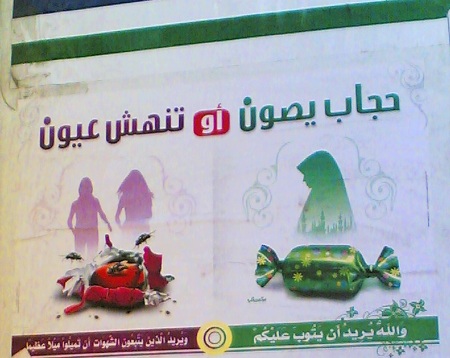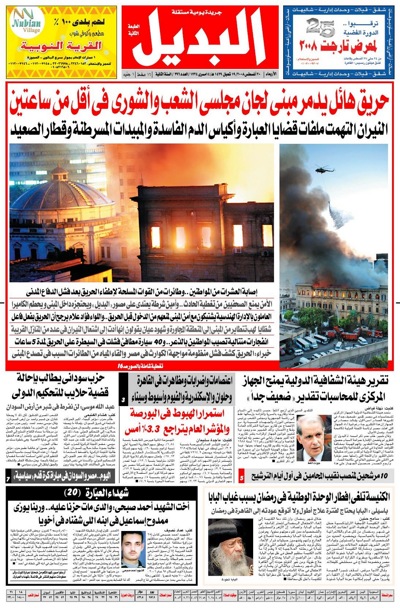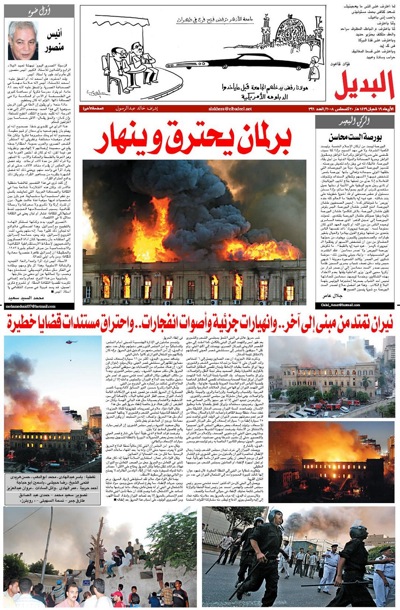1114 The Streets of Egypt Are Changing
Elijah Zarwan, Foreign Affairs, 5 February 2013
Last week, on a public bus near Tahrir Square, passengers were trapped, pressed tightly together and choking on teargas as the vehicle struggled to maneuver around a standoff between hapless police conscripts and a crowd of young men making a stand along the bank of the Nile. The commuters, understandably, were furious. “Who are these people?” they asked with disgust as they wheeled passed stunted teenagers throwing rocks and making obscene gestures.
That is a question heard again and again over the last two years, as near identical scenes have played out with numbing regularity. Most Cairenes, President Mohammed Morsi, his cohorts in the Muslim Brotherhood, and the generals who ruled the country before them have agreed on a quick verdict: “these people” are paid thugs, the pawns of shadowy remnants of either the old regime or unnamed foreign governments. As Morsi charged last week, they are “the counterrevolution incarnate.”
Some among the rock-wielding crowd might indeed be paid agents. Sometimes, they arrive in the city center together on the backs of mini-pickup trucks. Sometimes, they appear to take direction from bald men with mustaches and bad leather jackets. Sometimes, their faces bear knife scars, broken noses, and other telltale signs of lives spent in Cairo’s dark underworld. Often their eyes are glazed and their speech erratic from cheap pills. That — and the fact that the Mubarak regime cultivated an auxiliary militia of drug addicts and criminals in poor neighborhoods for use when it was more convenient for civilian forces to carry out oppression — suggests that some of the chaos might, in fact, be organized.
But it would be a mistake to believe that is the extent of the problem. And it would be a further mistake to reduce the young men to paid thugs, or to blame the unrest on revolutionary anniversary pangs, Muslim Brotherhood misrule, or a court’s verdict — although those are all elements of it. True, it is difficult to systematically track the demographics of a stampede, but what most of those rushing to escape birdshot and teargas canisters have in common is that they are male, urban, young, unemployed, have very little to lose, and even less confidence in a political class that does not represent them. For them, the mantra of the uprising that began two Januarys ago — “Bread, freedom, social justice” — remains an urgent and unanswered demand.
If anyone doubted that Egypt’s unrest would continue until the urban poor saw a concrete improvement in their daily lives, the events of the last weeks should have convinced them otherwise. For the majority of the Egyptian population that grew up poor and has known no other president than Mubarak, life has been hard and has only gotten harder. The narrow streets of the urban slums admit little air. Decent work, already scarce, has become scarcer. Prices have continued to rise. Prospects for a dignified life — a steady job, marriage, and escape from the family home — have grown steadily more remote.
Before the 2011 revolution, some of the poor had turned to the streets, to pills, to hashish, to brawling, to fun. With the army out of domestic politics and the opposition in disarray, that street culture is likely the biggest check on the Islamist project. The dispirited urban population is perhaps now more heavily armed than at any time in modern history. Families –“honorable people,” as onlookers describe them — still join protests by day, but they melt away by night, and a leaner, angrier group takes their place.
The violent protests are still sporadic, yet to merge into a new revolution. In the meantime, though, the young, urban poor are already changing the streets. Since 2011, that population has rushed to fill whatever space the state’s contraction and the police’s retreat have left open. Soon after Mubarak’s departure, minibus stations popped up on snarled street corners where police once stood. Stoned and rowdy street vendors have gradually taken over Cairo’s Talaat Harb (formerly Suleiman Pasha) Street, an avenue that Egyptians of a certain age remember as “the most elegant in the Middle East,” or as “more beautiful than Paris.” Unemployed young men have repeatedly blocked major traffic arteries in the capital and have destroyed the lobby of a five-star hotel. City streets and alleyways are harder and more lawless, as more people compete for fewer resources. Tempers fray, and manners are forgotten. The level of street crime, which was always miraculously low for a city of more than 20 million, has risen.
For years before the 2011 uprising, many anticipated a “revolution of the hungry.” Many still do, as twin economic and political crises combine. When Mubarak fell, many poor Egyptians believed it had already happened, and expected Mubarak’s fabled billions to return to the country and fund apartments for everyone. At the time, a rich Cairene, a woman accustomed to speaking sharply to those she considered beneath her, was shocked when a worker she had hired refused to obey her instructions. “You must understand that you had your time,” he told her. “This is ours.”
But when Mubarak’s imagined billions did not return, and when his ouster did not immediately usher in a new age of prosperity and freedom, disillusionment set in. The middle class and the middle aged might have the patience to give electoral politics and stability a chance to work their magic. The unemployed youth do not. For them, the flux of the current revolutionary moment represents their last chance to salvage a better future for themselves and the country. The long-anticipated and feared “revolution of the hungry” may have already begun, albeit in slow motion.
Egyptians have shown a talent for retreating from the brink at the last minute. Despite regular bouts of unrest and civil strife, the country has limped onward. But given the dire economic outlook, the toxic political atmosphere, and the increasing impatience and desperation on the street, it might not always. Those who gave their lives in the uprising did not do so for Egypt to enter a limping race to the bottom, and those who continue to fill the streets will not stay quiet for long until that course is reversed, or until the government can restore at least some hope that their demands for bread, freedom, and social justice will be met.
1082 Amitav Ghosh on Egypt and Xenophilia
Amitav Ghosh, writing in Outlook magazine, fondly remembers his time spent in the Nile Delta as a young man, reflects on the non-aligned movement, and hopes that people from far-away lands will meet each other face-to-face more often:
The other principal association that rural Egypt had with India was the matter of water-pumps, which were of course very important in rural communities. In those days Egypt imported so many water pumps from India that in some areas these machines were known as makana Hindi or simply as Kirloskar, from the name of a major pump-manufacturing company. The purchasing of a water pump was a great event, and the machine would be brought back on a pick-up truck, with much fanfare, with strings of old shoes strung around the spout to ward off the Evil Eye. Long before the machine made its entry into the village, a posse of children would be sent to summon me: as an Indian I was expected to be an expert on these machines, and the proud new owners would wait anxiously for me to pronounce on the virtues and failings of their new acquisition.
Now it so happens that I am one of those people who is hard put to tell a spanner from a hammer or a sprocket from a gasket. At first I protested vigorously, disclaiming all knowledge of machinery. But here again, no one believed me; they thought I was withholding vital information or playing some kind of deep and devious game. Often people would look crestfallen, imagining, no doubt, that I had detected a fatal flaw in their machine and was refusing to divulge the details. This would not do of course, and in order to set everyones fears at rest, I became, willy-nilly, an oracle of water-pumps. I developed a little routine, where I would subject the machine to a minute inspection, occasionally tapping it with my knuckles or poking it with my fingers. Fortunately no machine failed my inspection: at the end of it I would invariably pronounce the water-pump to be a makana mumtaaza a most excellent Kirloskar, a truly distinguished member of its species.
Yet, even as I was disclaiming my relationship to those water-pumps, I could not but recognize that there was a certain commonality between myself and those machines. In a way, my presence in that village could be attributed to the same historical circumstances that introduced Indian pumps and Indian films to rural Egypt. Broadly speaking, those circumstances could be described as the spirit of decolonization that held sway over much of the world in the decades after the Second World War; this was the political ethos that found its institutional representation in the Non-Aligned Movement. We are at a very different moment in history now, when the words Non-Aligned seem somehow empty and discredited; today the movement is often dismissed not just as a political failure, but as a minor footnote to the great power rivalries of the Cold War.
It is true, of course, that the movement had many shortcomings and met with many failures. Yet it is also worth remembering that the Non-Aligned Movement as such was merely the institutional aspect of something that was much broader, wider and more powerful: this, as I said before, was the post-war ethos of decolonization, which was a political impulse that had deep historical roots and powerful cultural resonances. In the field of culture, among other things, it represented an attempt to restore and recommence the exchanges and conversations that had been interrupted by the long centuries of European imperial dominance. It was, in this sense, the necessary and vital counterpart of the nationalist idiom of anti-colonial resistance. In the West, Third World nationalism is often presented as an ideology of xenophobia and parochialism. But the truth is that many of these movements of resistance tried very hard, within their limited means, to create an universalism of their own. Those of us who grew up in that period will recall how powerfully we were animated by an emotion that is rarely named: this is xenophilia, the love of the other, the affinity for strangers – a feeling that lives very deep in the human heart, but whose very existence is rarely acknowledged. People of my generation will recall the pride we once took in the trans-national friendships of such figures as Nehru, Nasser, Sukarno, Chou En Lai and others. Nor were friendships of this kind anything new. I have referred above to the cross-cultural conversations that were interrupted by imperialism.
These interruptions were precisely that temporary breakages the conversations never really ceased. Even in the 19th century, the high noon of Empire, people from Africa, Asia and elsewhere, sought each other out, wrote letters to each other, and stayed in each others homes while traveling. Lately, a great number of memoirs and autobiographies have been published that attest to the depth and strength of these ties. It was no accident therefore that Mahatma Gandhi chose to stop in Egypt, in order to see Saad Zaghloul before proceeding to the Round Table Conference in London. This was integral to the ethos of the time. [Full Essay…]
Thanks, SP
1065 Give Nagla the Attention She Deserves
…Which is to say none at all. Perhaps if everyone pretends Nagla al-Imam doesn’t exist, she’ll go away. In the meantime, she’s shooting her mouth off to anyone who’ll listen.
Nagla was sent by a women’s rights organization to fly the flag at the trial of the man who sexually harassed Noha Rushdie. After the trial she falsely claimed Noha was Israeli (she’s not; she’s Palestinian, born in Libya and raised there and in Egypt), and proclaimed she was going to work for the convict’s release. I understand Nagla lost her job because of the controversy she caused.
Then, speaking on Al-Arabiya on October 31, she called on Arab men to sexually harass Israeli women as “a form of resistance.” (leave it to MEMRI to feature the stupidest, ugliest things said on TV in Arabic, ignoring the condemnation). I tried to ignore this offensive idiocy (have Arab women and men and “resistance” really fallen so low?), hoping it was her last cry for attention before she faded into obscurity.
No such luck. Now she’s telling Youm al-Sabaa that the convicted man’s name was on President Mubarak’s list of people to pardon this Eid. Youm al-Sabaa quietly acknowledged at the bottom of the article that it has no source for this story save a phone call to Nagla, and that the president traditionally pardons only convicts who have already served at least nine months in jail. But that didn’t stop the paper from calling Nagla and running her claims under the alarming headline, “News of the Release of the Man Who Molested Noha Rushdie.” The following day, Youm al-Sabaa ran another story saying the rumor (they started) was not true.
Only Noha comes off well in this whole sorry tale. The man who harassed her comes off like a sleaze. Nagla comes off as unhinged. And the journalists who give her a platform look so desperate for news over the holiday that they’ll call up any loon with something inflammatory to say, dress her rants up as fact, and then get a second story out of saying their previous story was untrue.
There are millions of stupid people with inflammatory things to say in this world. Let’s not neglect them. If Youm al-Sabaa‘s journalist will send me his email address, I promise I will supply him with one inflammatory and inaccurate quote collected from someone on the streets of Cairo a day, so long as he stops calling Nagla.
1053 2:53 of Viewing Pleasure
Thank you, Ahmed
1033 Riots, Detentions, Harassment, and Hashish
Busy with work, but wanted to flag a few items from the past few days:
* Two thousand people rioted in Aswan after police mistakenly killed a bird-seller in the southern Egyptian city.
* Egyptian activists yesterday staged protests to call for the release of 16 people detained in the southern city of Samalout in mid-October. Police used tear gas and batons to disperse an angry crowd that gathered when police killed a pregnant woman on October 8 as they searched her house.
* The protesters also called for the release of two activists, Mohammed Adil and Mohammed Khairy, suspected of trying to deliver humanitarian supplies to Gaza. State Security officers raided Mohammed Adil’s home in the early hours of November 21. State Security officers have detained Mohammed Khairy twice since October, and prosecutors have twice ordered his release, yet the latest reports I’ve seen indicate he is still in custody. Both are sympathetic to the Muslim Brotherhood, and both maintain blogs. Noha Atef is doing a great job covering this for Global Voices.
* An Iranian reader wrote in to chastise me for writing about Hossein Derakhshan’s possible detention while ignoring two less ambiguous detentions. I am much ashamed.
* Egyptian police announced last Wednesday that they had arrested 550 boys in Cairo on suspicion of sexually harassing schoolgirls. The police reportedly focused their raids on Internet cafes near schools.
This drives me nuts. If there is an appropriate security response to sexual harassment, it is ensuring that women and girls feel comfortable reporting incidents and ensuring that police follow up on the reports. Rounding up boys by the hundreds for using the Internet is not the answer. Educating them from an early age to treat women with respect is.
* By the hash-o-meter, Barack Obama may be the most popular foreign leader in Egypt since Saddam Hussein. Wael Abbas reports that dealers are selling Obama-brand hashish in the Mediterranean town of Marsa Matrouh. 3arabawy recalls that “in 2003, a quite popular brand of hash that appeared in Cairo was named ‘Saddam’ coz it was ‘stronger than chemical weapons.’ “
1005 And Now, for Something Completely Different…
This is the funniest thing I have seen in a long, long time. Well worth the long download time.
(And the more I think about it, the more in keeping with the spirit of the original it seems.)
695 Parliament Destroyed, Paper Banned
Let me never again complain that things happen in Egypt only when I’m out of the country. I was at a meeting two blocks away from Parliament around the time the fire started in the Shura Council yesterday. I noticed nothing as I was leaving (the air is always full of smoke), and learned of the disaster only via SMS when I got home. I watched the fire on TV like millions of other squares.
Word has it that Al-Badil‘s late edition was banned last night for its reporting on the fire [UPDATE: I’m now hearing the paper wasn’t officially banned. The government-owned Al-Ahram printing house simply delayed publication of the edition until it was too late, effectively ensuring that it didn’t come out. FURTHER UPDATE: The edition came out the next day, toned down]. The daily has published the edition online (full paper in a compressed file here). For convenience’s sake, I’m posting their coverage as image files here:
While I was in India for a wedding, it seems two big stories broke in Egypt:
- The state introduced stiff new traffic laws in a Quixotic attempt to curb the chaos and gridlock that paralyzes Cairo. That Al-Ahram Weekly story doesn’t mention the fines for professional drivers who smoke behind the wheel. Nice for nonsmoker passengers, but probably foolish to produce hundreds of thousands of pissed-off, nicotine-deprived taxi drivers.
- The Cairo and Alexandria Stock Exchange took a dive when rumors suggested that a prominent Egyptian businessman had fled the country following the arrest of suspects in the brutal murder of Lebanese singer Suzanne Tamim. Stocks rebounded when the businessman and his friends debunked those rumors. A government ban on reporting the story did little to keep the story quiet, but perhaps helped restore confidence in the stock market by suggesting the government would stand by the maligned millionaire. Feisty Al-Dustur ran the story; editor Ibrahim al-Mansur told AFP government agents pulled all copies of that edition as a result. General Prosecutor Abd al-Magid Mahmud reportedly lodged yet another case against Managing Editor Ibrahim Eissa in connection with the affair.
In unrelated news, Global Voices has an excellent update on online censorship in Tunisia, and Ellen Knickmeyer has an article for the Washington Post about those nauseating “Veil Your Lolipop” ads.
681 ‘A Veil to Protect or Eyes Will Molest’
Late to this, but these adverts for the hijab, via Hatshepsut and Ursula, have put a bee in my bonnet:

“You Can’t Stop Them, but You Can Protect Yourself.”

“A Veil to Protect or Eyes Will Molest”
A few simple points:
- The hijab is a poor defense against sexual harassment.
- Whether a woman chooses to wear the hijab should be her choice alone. She should not be coerced or pressured either way.
- Men, it is our responsibility alone to make our thoughts and behavior honorable.
Along the same lines, see “Shame and Sexual Harassment” from Mona Eltahawy.
677 Chahine
Don’t miss Baheyya’s post memorializing Youssef Chahine, Egypt’s most celebrated director, complete with scans of the original publicity pamphlets for some of his best films. I will remember him as the director of Al-Ard and Bab al-Hadid, one of my favorite films from any country.
From Bab al-Hadid:
From Al-Ard:
595 Harum Scarum
Via Worthy Oriental Gentleman, for your entertainment: “Elvis, a thieving midget, dancing girls, and an Oriental souq.”
39 queries. 0.143 seconds. CMS: WordPress. Design: modified Hiperminimalist Theme.
RSS for posts and comments.
Valid XHTML and CSS.

